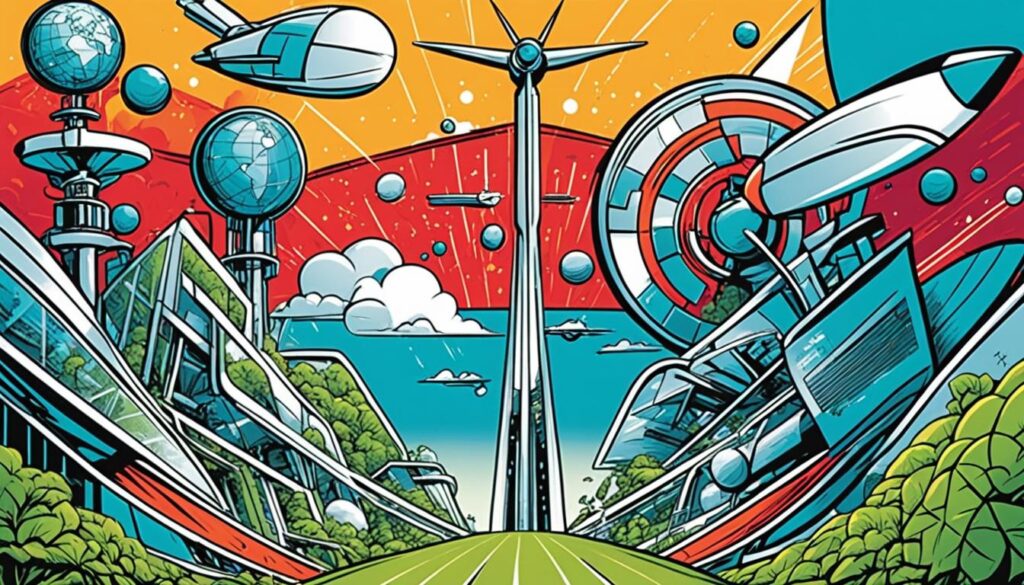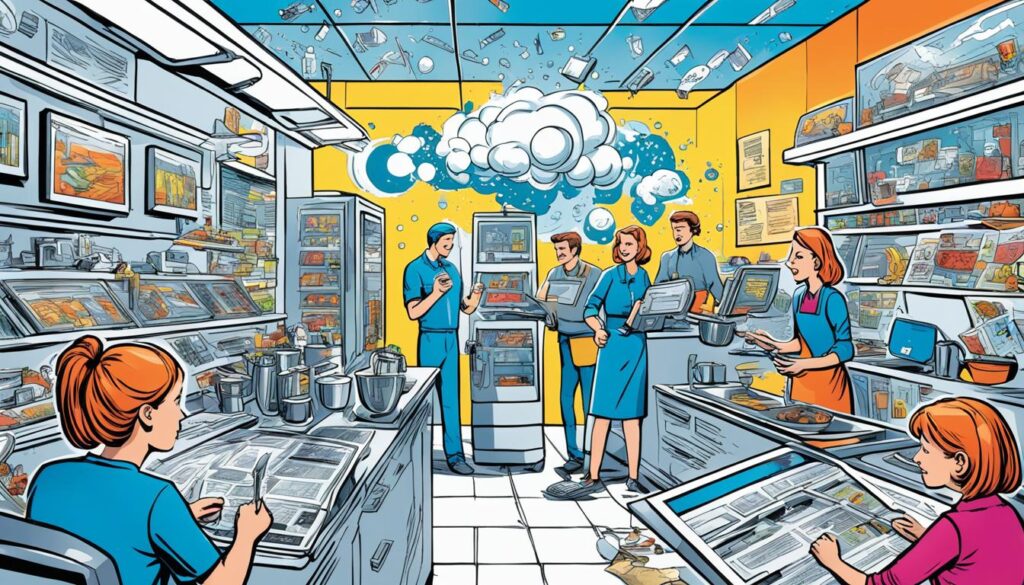Will artificial intelligence change our world a lot in the next 24 months? The rise of generative AI and machine learning is already shaping various industries. This shows AI is now more than just a future idea; it’s a powerful force already causing changes. The speed at which businesses are adopting AI makes us wonder: how will AI transform work, society, and daily life by 2025?
AI’s influence is becoming more evident. Automation could change the job market, sparking debates on ethics and privacy. Sectors like healthcare might see big improvements through AI, like in diagnostics and finding new drugs. But handling powerful AI technologies safely is a major concern.
We’re at a turning point heading towards an AI dominated era. It’s important to look at how AI will change our lives. Will it spark innovation and progress, or cause problems we’re not ready for? Let’s look into what the AI revolution could bring.
The Evolution of AI: From Checkers to Generative Models
Artificial intelligence (AI) has come a long way since it began. It has changed many industries with its advancements. From winning games like chess to helping create vaccines, AI’s journey is truly amazing.
Early Successes in AI: Deep Blue and IBM Watson
IBM’s Deep Blue was a groundbreaking AI that beat chess grandmaster Garry Kasparov in 1997. This win showed AI’s potential in outsmarting humans. In 2011, IBM’s Watson won against top human players in Jeopardy!, proving it could understand and answer questions like a person.
The Rise of Generative AI and Large Language Models
In the last few years, generative AI and large language models have changed AI. Models like OpenAI’s ChatGPT can produce text that sounds human. They use lots of data and smart software. This has opened up new ways for us to interact with AI and create content.
AI’s Role in Vaccine Development and Human Speech Modeling
AI is also making a big impact in health and technology. It has been key in making vaccines faster by helping identify good candidates. In speech tech, AI has improved how computers talk and understand us. This shows how AI can help in many fields and bring new ideas to life.
AI’s Potential to Transform Business Automation
Artificial intelligence is getting better and will soon change how we do business. It’s already happening. AI is making work smoother, faster, and sparking new ideas. Let’s look at how AI might change the business world in the next few years.
Increased Adoption of AI in Various Industries
About 55% of companies are using AI in some way. This includes places like factories, hospitals, banks, and stores. As more companies see what AI can do, more will start using it too. This means in the future, AI will be a big part of how companies do their work.
Chatbots and Digital Assistants for Customer Service
AI is making a big difference in customer service through chatbots and digital assistants. These smart programs can talk to customers, answer basic questions, and support them. They work round the clock, improving response times and helping real customer service workers focus. This makes customers happy and allows companies to handle a lot of queries.
Data-Driven Decision Making with AI Analytics
AI is also helping in making better decisions using data. Companies have a lot of data. AI sorts through all this fast, finding trends and useful insights. It turns complex data into easy-to-see visuals. This helps leaders make quick and smart choices. It’s like having a data expert at your fingertips all the time.
AI is becoming more a part of how businesses get things done. It doesn’t just streamline work; it helps businesses treat their customers better. It also makes smart decision-making faster and easier. For companies to do well in the future, using AI wisely is key.
Navigating Job Disruption in the Age of AI
AI is getting better and joining our work lives more. People worry about their jobs because of this. They think that about a third of what they do might be done by AI. But, not all jobs face the same risks.
Jobs that often repeat the same tasks may be taken over by AI first. For instance, AI might replace secretaries. Yet, jobs needing AI skills are on the rise. We need more machine learning experts and cyber security analysts. This creates an AI skills gap that we need to fill.
Highly skilled workers and creative jobs might not lose out to AI. Rather, AI can help these workers do even more. It can take on their simpler tasks. This lets them put more focus on doing creative and intuitive work. But, they will still need to learn to work well with AI.
With AI changing our work, everyone needs to keep learning. Employees should learn how to work with AI. And companies should help by offering training. By being ready to keep learning, we can overcome AI’s changes and keep our jobs safe.
Addressing Data Privacy Concerns in AI Development
Artificial intelligence is growing fast, becoming a big part of our daily lives. Because of this, keeping our ai data private is very important. Companies that make AI need a lot of data to teach their machines. This has caused worries about how they gather this ai data.

Recently, the Federal Trade Commission (FTC) started looking into OpenAI’s data collection. They want to see if OpenAI’s actions have hurt people. This highlights why it’s so important for AI companies to collect data responsibly. It also shows why strong rules for ai data privacy are needed.
Investigations into Data Collection Practices of AI Companies
The FTC’s look into OpenAI’s data collection is a big warning for the whole AI business. It points out the need for better checks on ai data collection. Companies should make sure their ways of gathering data are clear, moral, and follow the law. This is to keep people’s trust and to protect their privacy.
The AI Bill of Rights and its Core Principles
The Biden-Harris team has put forth the AI Bill of Rights to safeguard people’s rights in the AI era. This effort has spotlighted ai data privacy as a major concern. Though it’s not a law yet, this effort is a big move. It shows that protecting data privacy and making AI companies responsible are top goals.
The Push for Transparency in AI Training Data Compilation
Today, there’s a big ask for transparent ai training data from the AI community. Customers and others are asking AI companies to be more open about their data use. Being clear about their data practices and caring a lot about privacy can help AI makers earn people’s trust. This means they can build AI products safely and with care.
Dealing with ai data privacy concerns is crucial. AI is changing many fields and our everyday lives. We must work hard to keep personal data safe. By taking action with things like the AI Bill of Rights and asking for more transparent ai training data, we can help create a better AI world. This world respects people’s privacy and supports careful innovation.
The Evolving Landscape of AI Regulation and Governance
Artificial intelligence is getting better fast. This means the rules around AI are also changing quickly. Soon, how we regulate and control AI will be key to its future. Lawsuits about AI, like those for owning ideas, will shape the whole industry.
OpenAI, a top AI organization, is in hot water with copyright lawsuits. The suits come from authors, artists, and big names like The New York Times. They argue about how AI learns from lots of data. The results will influence how AI is controlled and affect companies like OpenAI.
Ethical worries about AI that creates stuff are getting more attention. The U.S. government’s approach is to walk a middle path. They’ve set rules on data privacy, freedom, and using AI rightly. But, rules might get tougher as people see AI’s real impact.
We’re facing both challenges and chances with AI. Finding the right mix of encouraging new ideas and watching over AI is vital. People in power, those leading the AI field, and others need to work together. Together, they can make regulations that encourage AI to grow safely. This way, everyone’s rights are looked after.
The next few years are big for AI rules. Lawsuits, public views on AI, and gov. actions will shape how we control AI. By speaking up about these issues now, we hope to guide AI’s path. This way, AI can boost progress and still be fair and open.
AI’s Impact on the World in the Next 2 Years: Industry-Specific Disruptions
Artificial intelligence is advancing quickly. It’s changing industries like manufacturing, healthcare, finance, and education. In the next two years, we’ll see big changes as AI tech grows.
AI in Manufacturing: Robotic Arms and Predictive Maintenance
The manufacturing world is already using AI in big ways, like with robotic arms. AI-powered machines work with people to do tasks perfectly and quickly. These systems can assemble and check products. AI also helps by fixing machines before they break, which saves money and time.
AI in Healthcare: Disease Detection and Drug Discovery
In healthcare, AI is making big improvements too. It helps spot diseases early from images like X-rays. It’s also great at finding new drugs. AI can sift through lots of info to predict which drugs might work well. It’s even helping care for patients through virtual assistants.
AI in Finance: Fraud Detection and Risk Assessment
Finance is using AI to fight fraud. It spots odd patterns in deals fast to stop fraud. AI also helps banks decide who they should loan money to safely.
AI in Education: Personalized Learning and Plagiarism Detection
AI is changing learning by making it personal. It looks at how students do to give special lessons and tips. It’s also finding copied work to keep schools fair.
AI in Media: Automated Journalism and Generative Writing Tools
In the news world, AI writes some stories on its own. This lets reporters work on more creative stories. And it helps all sorts of writers by giving them ideas or even finishing what they write.
AI in Customer Service: Chatbots and Virtual Assistants
In customer service, AI means fast help and chatting that feels personal. AI understands and answers questions, making customers happy. It also looks at what customers do to suggest how to make service better.
AI in Transportation: Self-Driving Cars and AI Travel Planners
Transit is about to change a lot with AI. Self-driving cars will soon be common. They can drive and avoid problems by themselves. AI also helps plan trips better, picking the best way to go and even suggesting what to do.
Addressing the Risks and Dangers of AI Advancement
AI is changing the way industries work and bringing new ideas. But, we need to look at the risks it brings too. AI can make our jobs easier, but it might take some away. We must make sure that AI grows responsibly, so our future is safe.
Potential Job Losses and the Need for Upskilling
One big worry about AI is it might lead to job losses. As it becomes smarter, machines can do what people do. It’s said that by 2028, AI will change how 44% of jobs are done. This change won’t be the same for everyone – women are often more affected. And, because they might not have the right AI skills, it’s harder for them to find new jobs.
Companies need to help their workers learn new skills. They should offer training programs. This way, people can stay valuable in a world driven by AI. If businesses don’t help, we might see more people without jobs. It would make it harder for those already at a disadvantage to join the tech world.
Mitigating Human Biases in AI Systems
AI can also learn bad habits from us humans. If the people or data it learns from are biased, the AI may discriminate too. For instance, it might favor those with lighter skin when recognizing faces. This isn’t fair or right.
Fixing this starts from the beginning. AI teams should be diverse and the data they use should reflect everyone. Also, we need strong checks before AI is used, to catch and fix these problems early on.
Ensuring Ethical AI Development and Deployment
Using AI should always be done in the right way. There are many challenges like keeping things private, safe, and fair. Making AI act ethically means we can trust it and fix mistakes when they happen.
Places using AI should set rules to be good to everyone. This means thinking about how it affects people, like workers and customers. We also need to make sure AI isn’t used in bad ways and that it helps, not harms, us. This work never stops.
The Sustainable Future of AI: Balancing Innovation and Responsibility
As AI grows quickly, we must think hard about its effects on the earth. Some see it as a way to make things like supply chains better and to cut down on CO2 with smart maintenance. But many worry that AI’s need for lots of energy and materials might hurt the earth. Estimates even warn that AI could cause 80% more carbon emissions, which could slow down the tech industry’s push for a green future.

Using AI for green tech might sound good. But the problem is the cost to make and teach these AI systems. This cost could be more harmful to our planet. To make AI a part of a green future, we need to find a good balance. We must develop AI in a way that thinks about its impact on the planet at every step.
One important step is to use energy-efficient hardware and software solutions. This can make AI systems work better while using less power. Using renewable energy for AI’s needs can also help make our future greener.
It’s also key to make AI systems that focus on being green. These systems should use less data and space. They should even help solve big environmental issues. For example, they could help with saving resources, watching over nature, or predicting natural disasters.
Working towards green AI needs a team effort. Researchers, business leaders, government officials, and the public all need to be part of it. Together, we can set up rules, share ideas, and make AI that helps the earth. Keeping a green mindset as we use more AI is very important. The choices we make now will really shape our future.
Conclusion
The ai future impact in the next two years will be huge. AI is set to change industries and jobs. It will shape a future full of innovation and new challenges. But, we must also think about the ethics and risks that come with it.
To make the ai future impact positive, we need to focus on responsible ai development. This involves dealing with issues like job changes, keeping data safe, and avoiding biases in AI. We must set rules for AI to be fair, open, and helpful to everyone.
The goal for a sustainable ai future is to balance AI’s power and its risks. By carefully using AI, it can help us do amazing things. We can improve our abilities, innovate, and make the world fairer and better. Although it will be a tough journey, steering AI towards good use can lead to a future where it benefits us all.
